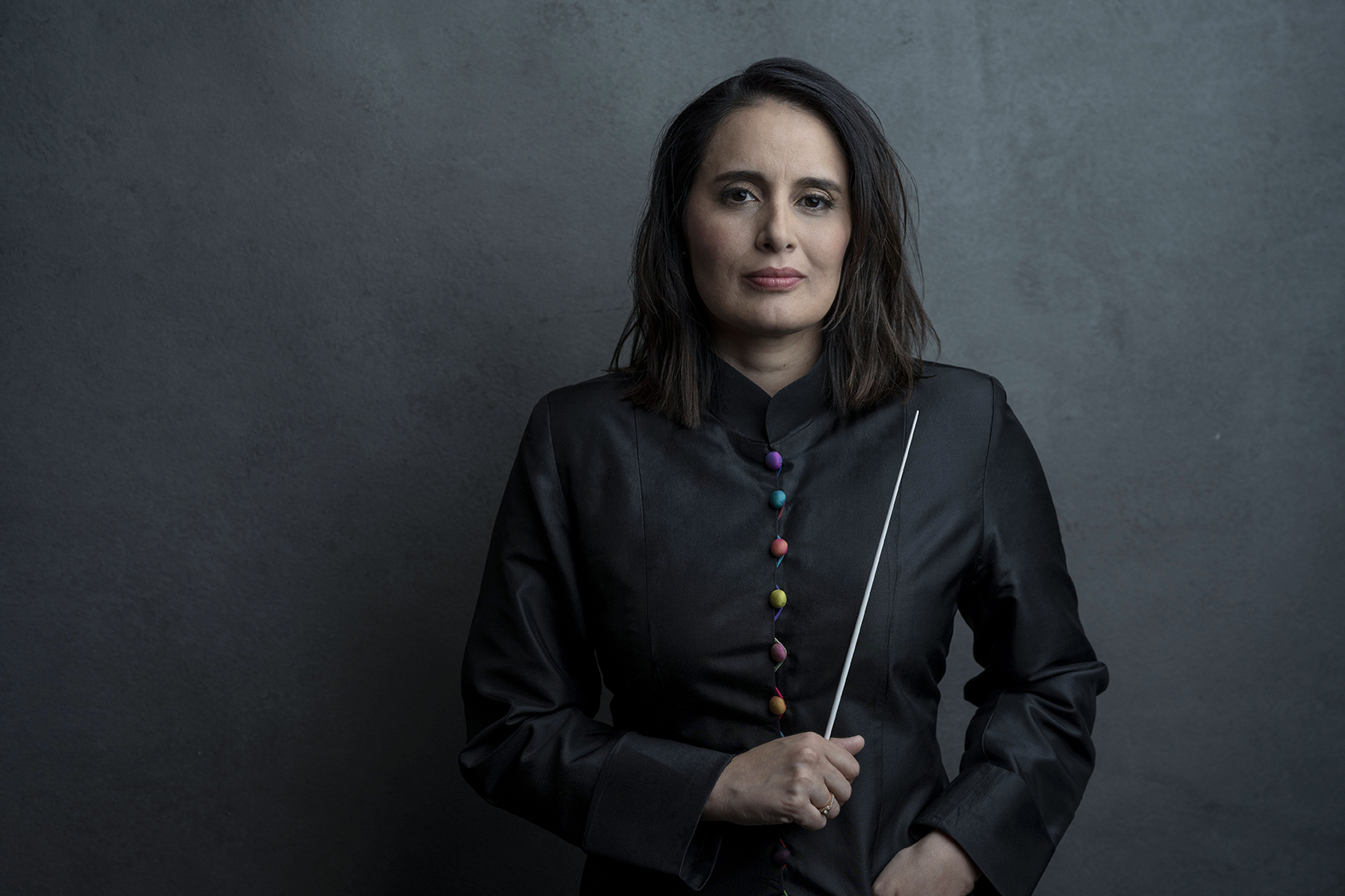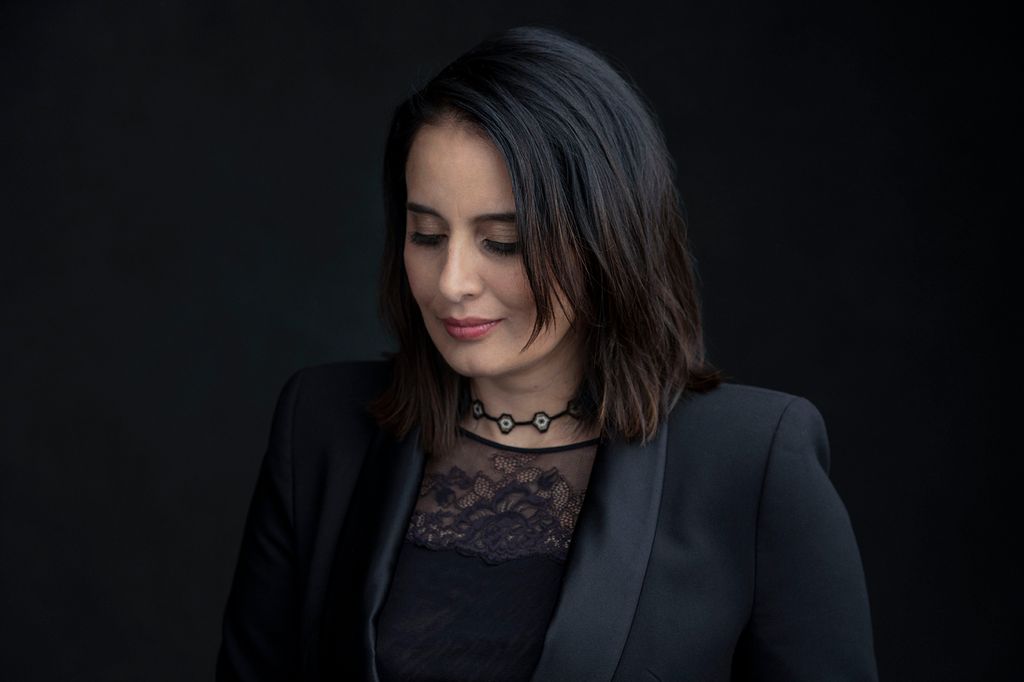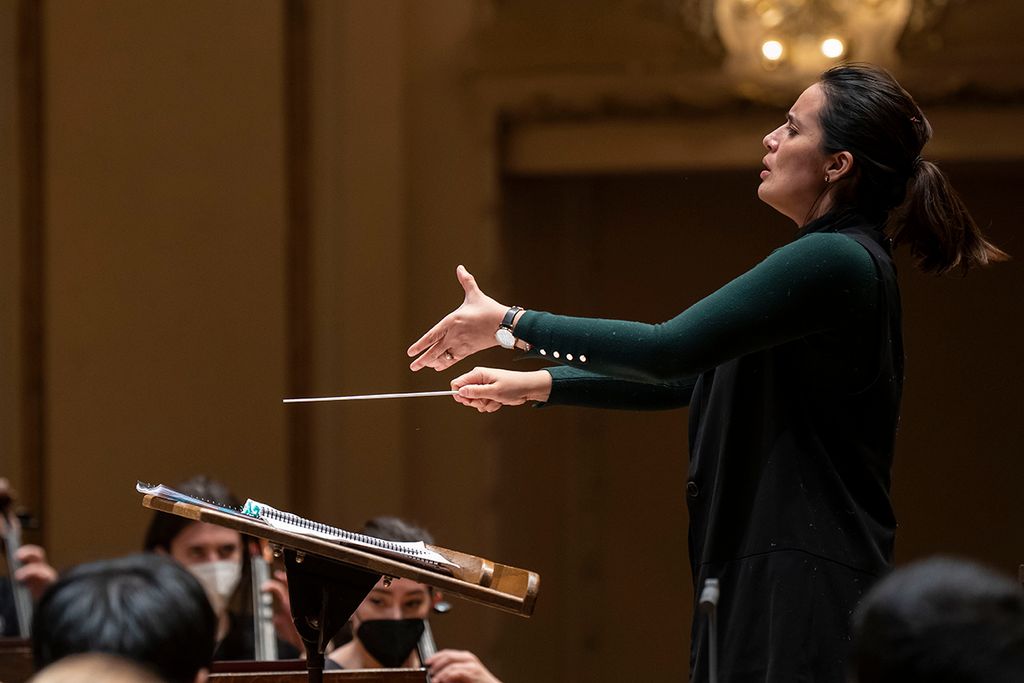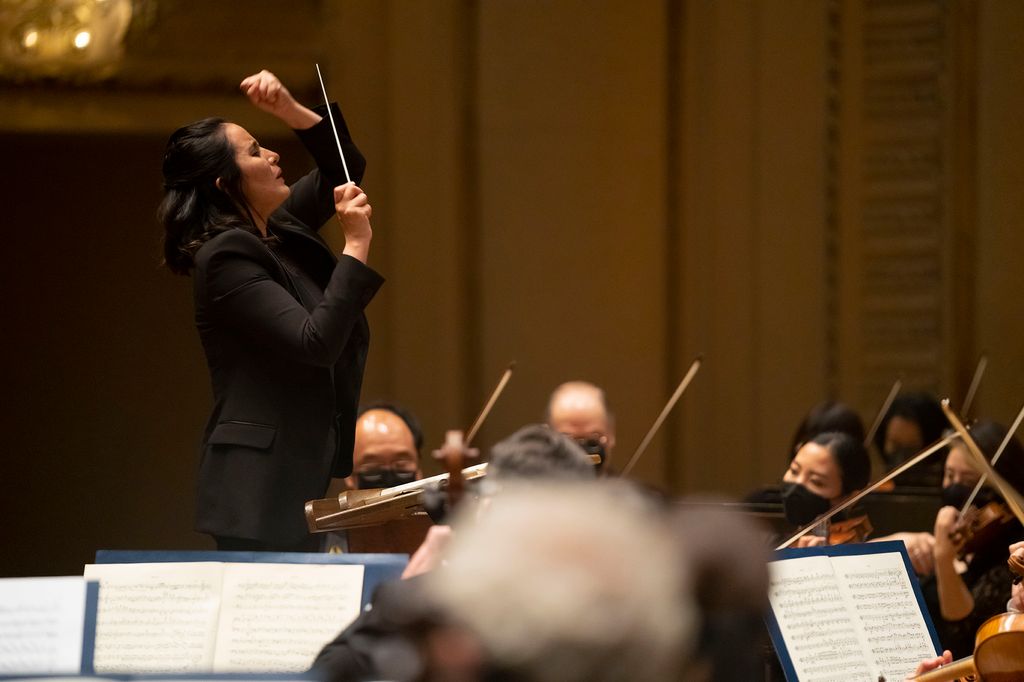Conducting Change
Conductor Lina Gonzalez-Granados hopes to open doors for more women of color in classical music

Lina Gonzalez-Granados was appointed resident conductor by the LA Opera, a position she has through June 2025. Photos by Todd Rosenberg
Conducting Change
Lina Gonzalez-Granados hopes to open doors for more women of color in classical music
Female conductors are vanishingly rare in classical music, especially at its highest echelons. Lina Gonzalez-Granados is getting there fast.
After winning the fourth Chicago Symphony Orchestra Sir Georg Solti International Conducting Competition, in 2020 Gonzalez-Granados (’20) was named the new Solti Conducting Apprentice under the guidance of Maestro Riccardo Muti, a post she will hold until June 2023. She was also appointed resident conductor by the LA Opera, a position she has through June 2025. She has been a conducting fellow of the Philadelphia Orchestra and the Seattle Symphony.
Gonzalez-Granados is also an immigrant—not a big deal for white men from Europe, but another challenge for a woman from Cali, Colombia. In fact, she says, being Latina was often more of an obstacle than gender. Her success has much to do with her calling forth a “rich, heartfelt orchestral sound” (Chicago Sun-Times), “rhythmic vitality” (San Francisco Chronicle), and “raw power” (LA Times). But it also required considerable determination.
She came to the United States in 2010, earned a master’s from New England Conservatory (NEC) and a doctorate at CFA. While in Boston, she founded the Unitas Ensemble chamber orchestra, which promoted and performed the works of Latin American composers; it’s dormant now because of her recent move to Philadelphia with her husband, trumpet player Andrew Moreschi.
We talked to Gonzalez-Granados about the resistance she has faced in her career, and how she hopes doors will open for all.

CFA: It seems that coming to the United States in 2010 was the first door you had to open because there weren’t enough opportunities for you in your home country?
Lina Gonzalez-Granados: It’s about a gender bias that has permeated there, but it’s not only about gender; it’s also how centralized and very little the opportunities in culture are in my country. All the things that are of the level that I would have aspired to in order to grow would be only in Bogotá or Medellín. Yes, I lived in Bogotá and did my undergraduate study there, but at the same time I was kind of an outsider, you know? The schools were very closed, and if you were in one school, you weren’t in the other. So all the opportunities were very fragmented. I always took it seriously, but I think there was a more serious rigor in the schools here, to set me up for better opportunities.
But there were also challenges here?
Yes, it was different, because you had to add the race identity, which is something that is very unique in the States from other parts of the world, and how Latinos feed into not only the web of classical music, but actually how we feel in society. And that was my first encounter with that reality, which I think was way more significant than gender, because gender was slowly progressing.
Was the bias against Latinos subtle or right in your face?
There was very direct and outright closure of doors. But it really didn’t matter because then I kept studying and studying and trying to find the opportunities. I was moving around, not necessarily waiting for that door that was closed to be open, because I think once it’s closed, it’s closed; there is no way to change people’s minds. The only thing that I could keep doing was learning, which was my priority…just to learn as much as possible, for when the opportunity came I was more ready than anybody else. I think it was harder to be in academia than outside. Regardless of the universities that I studied at, there was little to no interest in making sure that all the opportunities were equal for everyone, and that was very clear.
Did people say they didn’t want to work with a Latina conductor?
No, not in those words, but they were like, “You should go to your country and contribute there.” When they asked me about my dreams and aspirations, it was like, “Why don’t you go back? Your country would be better served if you go back instead of staying here.” Those were the words. It was not the easiest.


I interviewed composer Missy Mazzoli (BUTI’98, CFA’02), who told me that she was often the only woman in her class and that often there were no female faculty either.
In my groups, I was always the only woman in orchestra conducting. In my time at NEC, the first year we were only two people, and it was fantastic because it was a Venezuelan guy and me. So that was very, very nice, because we were able to form a bond out of that. We didn’t do anything but just work and enjoy each other’s company. We’re talking about 2013 and 2014. Sometimes there were [public] commentaries that in this era would be absolutely reprehensible. And it’s like, oh, right, this is racism. At that moment, there was not that much awakening to how much you can hurt someone by your words, especially in education. Things have progressed very fast.
I gather that you also found some mentors, though, who helped you along.
Oh, yes, absolutely. I mean, we’re talking about all the bad things. But the good thing is that within my community I did find extraordinary mentors and supporters. Benjamín Juárez, he’s a professor of fine arts emeritus now, and he was the CFA dean before all of this happened. He was very supportive of my endeavors. All of this, all it did was inspire me to find more voices in my art, to find a louder voice in my Latin American art. And from being isolated, I started to surround myself with people who felt that they could help me artistically, and he was one of them; and from then it just grew.
He introduced me to [American conductor] Marin Alsop one day, and she also became a big supporter of my art. And then, after marrying, I started getting busier outside Boston, and ultimately I started getting a lot of notoriety because of these endeavors.
Marin Alsop, then Baltimore Symphony Orchestra music director, was a rarity—a woman on the podium in America. She must have discussed that with you?
Of course. Marin has always helped us when we are breaking barriers because she has been the first in a lot of things. For example, I’m now the first Latina to hold a major position in an opera company, a conducting position. And I was the first Latino ever to conduct the Chicago Symphony. Those are big things! And I can only empathize with someone like her because she did it—she was the first to do a lot of major things.
We talk about the responsibilities and we talk about the burden that it is to carry that. Because in the end, it falls to our good work to open other doors for other generations. So, that’s a huge responsibility to bear.
There were other mentors besides Marin Alsop and Benjamín Juárez?
Bramwell Tovey [former BU director of orchestral activities] was the best mentor I could ever have. It’s still a little bit painful [thinking] about his passing [in July 2022], but I do carry everything that he taught me every day. He was the most positive man I’ve ever met. It was because of him I ended up graduating and closing that chapter in happiness. He opened every major door that I could find. When I found out about his passing—talk about feeling lonely! That day I knew that I lost my biggest champion.
What you are doing artistically is one of the most challenging things to do, with the additional layer of challenges for women and Latinos. There must be moments where all that really feels like a lot, and you must have found that strength somewhere…?
The older I get, the more I’ve realized that my strength comes from the love that I received from my family, and how grateful I am to have them supporting me on this journey, unconditionally. Whenever things got hard, I could always turn to my family. But when things were less difficult, and my parents were there and my husband was there, I tried so much because I was striving in the happiness and the love that I was receiving. That is my strength.
Have you seen changes in the classical world in the last few years of turmoil?
Definitely. For women, it started with #MeToo, which was a very important moment. This call to justice, it’s important in order to have a healthier business environment within the classical world. The only downfall is that we are reactionary, not proactive. So, things have changed because of the great cataclysmic and cultural things that have happened.
I’ve seen change. My hope is that women of color get all the opportunities. In the pyramid of parity, women of color are always last to be seen. I hope it is fast approaching. I hope it’s not because of something very dramatic happening, but only because we really need those voices.
